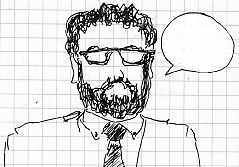Sunday, November 13, 2005
Appreciating Infinite Crisis #1
Stu Cicero: Geez! What kind of fans are you?! Ms. Walters is just trying to do her job! But all you want to do is snark at her and pick her apart!
Comic Store Guy #1: But the continuity...
Stu: Continuity! When I was growing up, if fans found a conflict in continuity ... they didn't try to trash it or tear it down! They looked at all the pieces.
The She-Hulk, #12
For formal reviews of the two issues of DC's Infinite Crisis that have so far appeared, look here, here, here, and here. Rather than a review, this post comprises an appreciation by a reader who has recently returned to comics and who agrees with Stu Cicero.
The creators of the seven-part mini-series promised that readers would experience the DC universe's darkest day. Now that issues 1 and 2 have been published, several relevant points are evident.
Things are pretty dark, indeed. Crisis points have been reached in every corner of the DC universe: most of the supervillains have organized themselves into a Secret Society; events on the off-worlds of Rann and Thanagar have exposed some kind of ominous rift in the universe; the Spectre, the most potent wielder of magic, has declared a war of extirmination on wielders of magic; and Wonder Woman's killing of a man who exercised complete mind-control over Superman has forced a rift between earth's mightiest heroes.
What's impressed me so far is the creative team's ability to keep both the large-scale and the human elements of the story in sharp focus. Aside from the revelation on the final page (of which I'll say more in a minute), I thought the most striking moment of the first issue took place during the meeting between Wonder Woman, Batman, and Superman. There's nothing "normal" about this; it takes place on the moon, amidst the charred ruins of the Justice League of America's destroyed watchtower. However, the writer and artist craft a tense face-to-face encounter that forcefully and economically lays bare the depth of the rift between them.
In the first part, Superman prevents Wonder Woman from dispatching a prone foe with her sword.
Batman: What are you doing?
Wonder Woman: What did you think I was going to do?
Superman (to Wonder Woman): I ... I don't know who you are anymore.
Wonder Woman: Of all people you know who I am. ... Who the world needs me to be. I'm Wonder Woman.
The conversation ends on a caustic note:
Superman (to Batman): I don't need to control everything.
Batman: For you, it's about setting an example. Everyone looks up to you. They listen to you. But they need to be inspired, and let's face it, "Superman" ... The last time you really inspired anyone ... was when you were dead.
The panel containing this line is followed by two that provide reaction shots that are utterly successful at showing the aftermath of such a charged interaction. The first depicts a stung-to-silence Superman, looking directly at 'us' (and, presumably, Batman); the next shows Wonder Woman. Her eyes are closed and her head's tilted downward; she's unwilling to meet the eyes of either man.
Two points:
(1) Advantage Batman.
(2) Regarding Wonder Woman: Can Superman and Batman be so dense?
This is the DC universe's darkest hour; it's no time for superheroes to be publishing books, or worrying about how their actions are likely to play on television. Diana is right: the world needs her to be Wonder Woman.
The final page of issue 1 reveals the unseen narrator who has been viewing and commenting upon events as the golden age Superman, last seen during the 1985 DC crossover Crisis on Infinite Earths. As he breaks the barrier keeping him separated from the events in the "real world," he utters his rallying cry: "This looks like a job for Superman."
Given the problems that the present-day heroes are experiencing, the arrival of earth's original superhero seems to be just what the doctor ordered. If anyone can get the situation sorted out properly, surely it's him... Or is it?
Considering the task before them, and the raw materials that were available for them to work with, I think that the creators made some very canny choices in moving this story forward. Their fine judgement here bodes well for future issues.
Disclaimer: it has been twenty years since I followed monthly superhero comics. (I made my way back to them through an interest in independent comics and graphic novels.) Though I preferred Marvel comics as a boy, my level of interest in DC's Infinite Crisis exceeds that for Marvel's House of M/Decimation and Spiderman/The Other crossovers.
